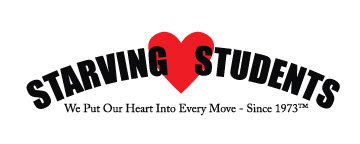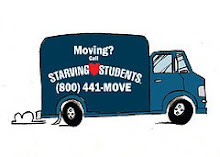Wednesday, July 16, 2008
Pets on Moving Day
Animals can become confused and frightened during a move. Consider leaving your pet(s) with a friend on the day of the move.
Tuesday, July 15, 2008
Keep these packing materials handy for a smooth move
- Markers and labels for labeling boxes
- Foam peanuts
- Bubble wrap
- Packing paper
- Tape & tape dispenser
- Scissors or a knife
Packing Tip #6 - Cushioning
Create cushioning to avoid damage. Pack 2-3 inches of loosely crumpled packing paper at the bottom of boxes and leave room at the top for more crumpled paper. Fill in empty spaces with more crumpled paper to prevent shifting.
How to save money on your move
The best way to save money on a move is to prepare as much as possible for moving day. A couple things you can do to speed up the move (thus cut costs) are:
- Pack all your items into boxes and do not use garbage bags. Boxes are faster and easier to move than plastic bags on the verge of ripping.
- Place the boxes near the main door or a garage, so the movers can quickly grab and load the boxes into the truck.
- Move smaller items yourself and leave the bigger, heavier items for the movers.
- Save or reserve a nearby parking spot for the moving truck. A closer parking spot means less time spent walking to and from the truck.
Moving Checklist - After the Move
- Turn off the utilities at your old address.
- Walk and drive around your neighborhood and community to orient yourself.
- Get new driver's licenses, library cards, voter registration cards, and bus passes.
- Order checks with your new address
- File your moving receipt. Some moving expenses are tax-deductible.
- Check your mail at your old home. Make sure mail is being forwarded to your new address.
Things to carry with you
- Keys to the new home
- Directions to new home
- Map of new town
- Money, cash, or credit card
- Documentation related to the sale of your home
- Insurance policies and agent's phone number
- Address book or personal planner
- Pets
- Jewelry & valuable items
- Prescriptions & medicine
- Important records & documents
- Photo albums
- Back up copies of important computer files
- Sheets and towels for the first night in your new home
- Personal hygiene items e.g. toothpaste, soap, and razor
Moving Checklist - Moving Day
- Plan to be home for the entire time it takes the movers to get packed and loaded. Be present to answer questions and give directions to the movers. Stay until they finish.
- Check that the Starving Students truck that shows up has our U.S. Department of Transportation number USDOT 318223 painted on the side.
- Accompany movers as they inventory your household goods and resolve any questions regarding the condition of materials being moved.
- Return garage control opener to apartment manager or new residents.
- Before the moving van leaves, take one final look throughout the house to make sure nothing is left behind.
- At your new home, show movers where to place furniture and boxes.
- Check inventory to make sure everything was delivered before signing delivery papers.
- Note any damages on the inventory sheet.
- Sign and keep a copy of the inventory sheet.
- Unpack valuable items first, such as silver, art, jewelry.
Moving Checklist - A Few Days Before
- Empty, clean, and defrost the refrigerator at least 24 hours before your move. Or get an ice chest to put perishable items from fridge.
- We'll call to confirm the moving day and go over the arrival time, inventory, and other details about your move.
- If you are not paying by credit card (Visa, MasterCard, or Discover), get a money order, a cashier's check, or cash to pay the movers.
- Prepare detailed directions to your new home for the movers. Also write down your contact information (a cell phone number is ideal).
- Ask the new occupants of your home or a neighbor to watch for mail after you move - and check in with them after two weeks, and again after a month.
- Have utilities turned on at your new address a day before the move date (gas, electricity, water).
- Drain and dry all water beds.
- Pack a separate bag with blankets and pillows to make your bed.
- Fill up gas in your car if you're driving.
Moving Checklist - One Week Before
- Try to finish packing a couple of days before moving day. Have your boxes labeled and numbered. Pack and clearly mark an "essentials" box of items you'll need right away.
- Set aside things you'll personally transport to your new home such as jewelry and important files such as medical, financial records.
- Disassemble stereos, TVs, beds, mirrors, etc.
- Notify both building managers of your move date. If possible, reserve the elevator and a parking space near the building of your old and new address for the moving truck.
- Fill any prescriptions you'll need in the next couple of weeks.
- Pick up items from cleaners, repair shops, or friends.
- Return any books on loan from the library.
Moving Checklist - Two Weeks Before
- Arrange to transfer or close your bank account. If necessary, clear out your safety deposit box, and put the contents in a safe box you'll take in the car for your move.
- Read booklet Your Rights & Responsibilities When You Move provided by Starving Students.
- Start cooking and eating any canned foods leftover in the cupboards.
- If you have pets, make sure you have a veterinarian selected near your new home in case there is an emergency.
Remember to alert these folks about your move
Alert the following about your move, either in writing, phone, or online:
- Banks
- Credit card companies
- Insurance companies
- Utility companies
- Human-resources department at work
- Doctors, veterinarians, and other health-care providers
- Lawyer, accountant, realtor
- Magazine and newspaper subscriptions
Moving Checklist - One Month Prior
- Make travel arrangements if moving long distance with airplane, hotel, and rental car agencies. If driving, get maps and directions.
- Call Starving Students to book your move date. A Starving Students moving consultant will explain all the costs and details of your move.
- If you don't have the original packaging, get estimates from professional crating companies to crate your plasma TV.
- Start packing, beginning with things you use infrequently. As you pack, note items of special value that will need extra valuation coverage.
- Fill out a change of address form at the post office to forward your mail. Or do it online at http://www.usps.gov/.
- Give your one month notice to the apartment manager.
- Get copies of medical records or forward them to your new providers, if you're moving out of the area. Ask for referrals.
- Send drapes, rugs, clothing, quilts, and bedding to the cleaners.
- Back up important computer files.
Six Weeks Before Move Date
- Order boxes and packing supplies at discount prices from Starving Students and get FREE shipping! Click Here.
- Cook and eat any canned foods left over in the cupboards.
- Check the measurements of your new home. Make sure that you have enough room for your larger pieces of furniture and that you can get them through the door.
- Hold a yard sale to reduce the move load.
Moving Checklist - Eight Weeks Before Move Date
- Go through your home and decide what you want to move, what you want to get rid of, and what you need to return to neighbors.
- Arrange to have school records transferred to your child's new school district.
- Write down your new address and put it in your wallet or purse in case you need to give it out and don't remember it.
Questions To Ask Moving Companies
When choosing a moving company, get as much information as possible. Below are some helpful questions to ask moving companies you're considering:
- Are they are licensed and insured?
- How do they charge hourly or by weight?
- Are there any additional fees?
- Do they charge extra for large items?
- Is there a minimum number of hours or a minimum charge?
- What is the cancellation policy?
- What are the procedures if damage or loss occurs?
- Are the movers full-time employees or day laborers?
- How will you be charged for travel time?
- Will my items be insured during the move?
- Are there things they will not move?
- Ask for references.
Packing Tip #4 - Small or Large Box?
Pack heavier items in smaller boxes and lighter items in larger boxes.
Packing Tip #3 - Labeling Boxes
Take the extra time to label your boxes with the rooms where the contents will be unpacked. You'll save yourself a lot of time organizing after the move.
Packing Tip #2 - Newspaper ink rubs off
Use bubble wrap and packing paper to wrap items. Beware of black ink rubbing off from newspapers.
Packing Tip #1
For boxes with delicate contents, clearly mark "Fragile" or "This Side Up" to lessen damage.
Organizing Tips For Your Move
- Reduce clutter at your new home by holding a yard sale or donating to charity.
- Fill out a change of address form at the post office to forward your mail.
- Try not to buy perishable foods. Cook and eat any canned foods leftover in the cupboards to reduce the move load.
- Keep a folder for all moving documents for easy reference.
- Remember to return books on loan from the library.
- Remember to return any borrowed items to neighbors.
How to Pick a Moving Company
- Ensure that the company is licensed and insured.
- Ask whether the movers are full-time employees or day laborers.
- Check with the Department of Transportation to see whether the moving company you are considering has a license to operate.
- Does the moving company pay workers’ compensation for their movers? Make sure that you are not liable if a mover gets injured on your premises.
- How do they charge hourly or by weight? Are there any additional fees? Do they charge extra for large items?
- What are the procedures if damage or loss occurs?
Subscribe to:
Posts (Atom)


